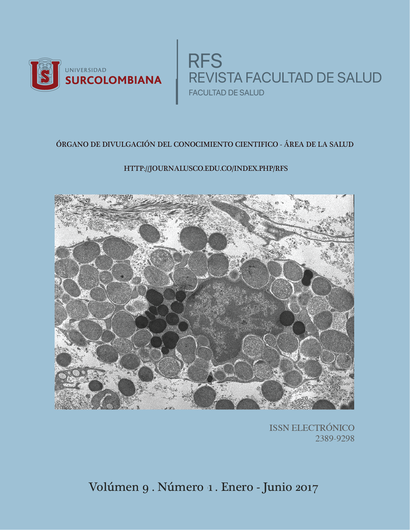Comparison of three surgical techniques in management of subdural chronic
##plugins.themes.bootstrap3.article.main##
Objective. We aim to compare the three surgical techniques most commonly used in the management of Chronic Subdural Hematoma (HSDC). Methodology. A cross- sectional descriptive study performed in 63 patients with diagnosis of CSDH and intervened surgically from January 2013 to February 2016. The results were analyzed by the statistical package SPSS-19. Results. The trepano-drill technique was the most used (88,9%) with the left hemisphere more affected (43.4%), also it had some lower post-surgical complications. The majority of patients obtained a Karnofsky score between 100 and 70 points. Conclusion. Draining of the chronic subdural hematoma using trepano-Drill technique showed more advantages over trephine and conventional craniotomy, which made it the best option in the management of this event.
Downloads
##plugins.themes.bootstrap3.article.details##
Jaramillo E. Hematomas subdurales crónicos unilaterales: presentación de 36 casos tratados quirúrgicamente. Influencia del control de la postura durante el post-operatorio en las recidivas de los hematomas. Rev Med. 2007; 29 (1): 16 – 24.
Oh J, Shim J, Yoon S, Lee K. Influence of gender on occurrence of chronic subdural hematoma: is it an effect of cranial asymmetry? Korean Neurotraumatology Society. 2014; 10(2): 82–85. doi: 10.13004/kjnt.2014.10.2.82
Secretaría de Salud de México. Diagnóstico y tratamiento del hematoma subdural crónico traumático en pacientes mayores de 18 años de edad. México; 2010.
Lacerda A, Estenoz J, Borroto R. Hematoma subdural crónico. Resultados quirúrgicos en 2 años de trabajo. Rev Cubana Cir. 1999; 38(1): 57-61.
Yuan L, Jun X, An-hua w, Yun-jie W. Burr- hole craniotomy treating chronic subdural hematoma: a report of 398 cases. Chin J Traumatol. 2010 Oct 1;13(5):265-9.
Sagobal R, Moscote L. Patobiologia del hematoma subdural crónico. Rev Electron Biomed / Electron J Biomed 2008; 2:65-71.
Velasco C. Decisiones neuroquirúrgicas en trauma cráneo encefálico. 2da edición. Colombia. 2014.
Chater G, González D, Peña G, Diaz J, Jiménez E, Hakim F. Hematomas subdurales crónicos tratados en el hospital universitario fundación santa fe de Bogotá. Neurocien Colom 2010; 17(4): 65-81.
Schwarz F, Loos F, Dunisch P, Sakr Y, Alsafatli D, Kalff R, Ewald C. Risk factors for reoperation after initial trepination in crhonic subdural hematomas. Clin Neurolog Neurosurg. 2015 Nov;138:66-71. doi: 10.1016/j.clineuro.2015.08.002.
Leroy HA, Aboukais R, Reyns N, Bourgeois, Labreuche J, Duhamel A, Lejeune JP. Predictors of functional outcomes and recurrence of chronic subdural hematomas. J Clin Neurosci. 2015 ;22(12):1895-900. doi: 10.1016/j.jocn.2015.03.064.
Huang Y, Yang K, Lee T, Liao C. Bilateral chronic subdural hematoma: what is the clinical significance. Int J Surg. 2013;11(7):544-8. doi: 10.1016/j.ijsu.2013.05.007
Oh HJ, Lee K, Yoon SM, Shim JJ, Yun G, Bae HG. Post-operativE course and recurrence of chronic subdural hematoma. J Korean Neurosurg Soc. 2010; 48(6): 518–523. 2010. doi: 10.3340/jkns.2010.48.6.518
Esquivel Miranda M, Arías Quirós M, Cartín Brenes M, Suárez-Sánchez MJ, Salazar-Sánchez L. Hematoma subdural crónico: análisis de 95 casos. Med. leg. 2012; 29 (1) : 17-21.
Alvis H, Alcalá G, Rubiano A, Moscote L. Hematoma subdural crónico: fisiopatología y manejo quirúrgico. Artículo de Reseña. Boletín Médico científico de la Asociación Médica de Puerto Rico. 58-63.
García MA, Pulido-Rivas P, Pascual-Garvi JM, Sola RG. Hematomas subdurales crónicos: arquitectura interna del hematoma como predictor de recidiva. Rev Neurol. 2014; 59:294-300. doi: 10.33588/rn.5907.2014262.










